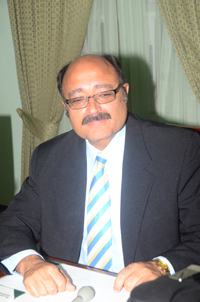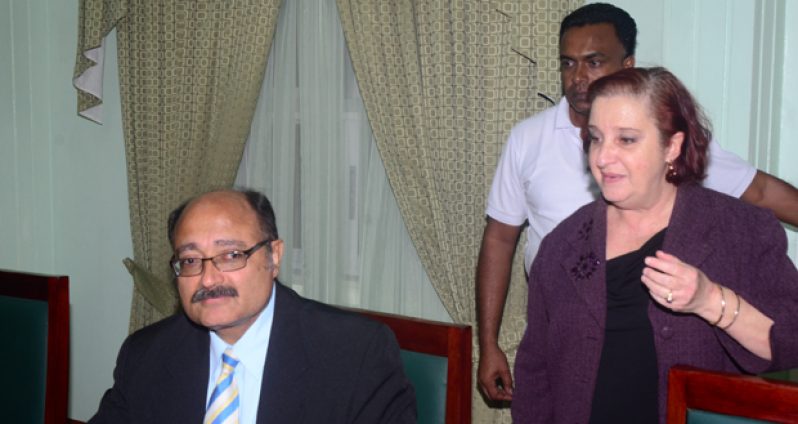…says CFATF Advisor
GUYANA, in no uncertain terms, has been informed that it must have the Anti-Money Laundering and Countering the Financing of Terrorism (AML/CFT) (Amendment) Bill passed and enforced by February 28.

This was according to Caribbean Financial Action Task Force’s (CFATF) adviser, Roger Hernandez, at a press briefing, which followed yesterday’s meeting of the Parliamentary Select Committee reviewing the AML/CFT Bill, at Public Buildings.
The CFATF official made it clear that CFATF is an independent body that does not involve itself in the legislative process of its member countries.
However, pressed for a comment on the three proposed amendments by A Partnership for National Unity (APNU), he acknowledged that the amendments are risky ones.
The three amendments seek to change the entire governing apparatus of the Financial Intelligence Unit (FIU); remove the Attorney General wherever that name appears and replace it with the FIU; and vest a police officer or customs officer with a power to seize currency from any person, anywhere in Guyana, if those officers have reason to believe that the currency is the proceeds of crime or will be used to finance crime.
Hernandez explained that there are two major risks in the amendments as presented: one that Guyana could become non-compliant in areas the country has already been deemed compliant; and two, that their implementations present several challenges in terms of effectiveness.
He stressed that these “observations” were made known to all the Committee members for their consideration.
“This is definitely something for the parties concerned to look at,” Hernandez said.
The CFATF advisor added that his observations are confined to the amendments in their current form – an acknowledgement that they are still to be finalized.
Whether the amendments become a part of the Bill, whose provisions the Committee has unanimously supported, or not, Hernandez noted that the enacted legislation will be subject to review by CFATF to ensure that it is compliant with required standards.
He reiterated that the concerns over the current risks of including the amendments, as is, into the Bill have been expressed.
“Once it is passed, we will have to look at it and analyse it,” the CFATF advisor said.
Hernandez disclosed to members of the media that once Guyana is required to submit a report to CFATF on February 28, which must include a copy of the enacted Bill, which will, after analysis, be correlated to the deficiencies identified by the body at its November 2013 Plenary meeting, before a report is made in May 2014.
Also, the report has to address Guyana’s plan of action to correct its deficiencies as part of the ongoing process, as well as report the conclusions on the AML/CFT (Amendment) Bill.
Between February and May, it is expected that there will be dialogue and discussions with CFATF and the current Administration, with regard to the preparation of the report for the CFATF Plenary.
If the May Plenary is dissatisfied with Guyana’s progress, CFATF’s November 2013 statement already provides the decision for the country’s referral to the Financial Action Task Force (FATF), which meets again in June 2014.
GETTING OFF THE LIST
The CFATF advisor pointed out that FATF’s International Cooperation Review Group’s (ICRG) Review could result in blacklisting at one of three levels.
This, he noted, could affect the financial sector and the average citizen in matters ranging from opening a bank account to Guyana’s ability to access funding from international development agencies.
However, Hernandez stressed that, of note, is the fact that Guyana is already on CFATF’s regional blacklist, following the body’s pronouncement in November.
At that time, CFATF said, “Guyana must therefore pass the relevant legislation and implement all the outstanding issues within its Action Plan including: 1) fully criminalising money laundering and terrorist financing offences; 2) addressing all the requirements on beneficial ownership; 3) strengthening the requirements for suspicious transaction reporting, international co-operation, and the freezing and confiscation of terrorist assets; and 4) fully implementing the UN conventions.
“Members are therefore called upon to consider implementing counter-measures to protect their financial systems from the ongoing money laundering and terrorist financing risks emanating from Guyana.”
According to him, once the AML/CFT (Amendment) Bill is put in place, Guyana will be required to report on its progress with the enforcement of the legislation.
He pointed out that getting off CFATF’s blacklist could take between 18 months and two years.
Hernandez said too that he is aware that some Caribbean entities have already “issued directives” for the appropriate measures to be taken to guard against the risks emanating from Guyana, due to the country’s non-compliance.
The CFATF advisor’s comment confirmed increasing concerns of many average Guyanese since last November of increased challenges with their financial transactions, among them are use of money transfer services.
Prior to the press briefing, Hernandez was part of the two-hour meeting, after the Select Committee at Wednesday’s meeting decided to offer an invitation for a CFATF official to be present to add clarity to several queries.
APNU Committee members, at the end of the meeting, requested a private session with the officials, which lasted for approximately 25 minutes.
The APNU members were unavailable for comment after their meeting with Hernandez.
Speaker of the House, Raphael Trotman, as an ex-officio Committee member, sat in on the first hour of yesterday’s meeting and told the Guyana Chronicle that Hernandez made it clear that the Bill, which is of national importance, must be passed and enacted by February 28.
“The gridlock on this matter must be broken….the nation has to have this legislation,” Trotman said.
Government members on the Committee contend that each of their positions, as it relates to deadlines, content of the Bill and the repercussions of missed deadlines have been vindicated by the clarifications provided by the CFATF advisor.





.jpg)








